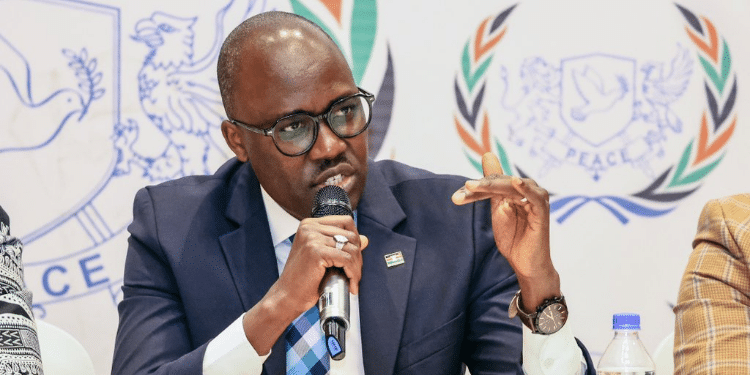
Kenya plans to seek a waiver on the newly imposed 10% U.S. tariff that could impact its exports to America. The tariff, announced by President Donald Trump’s administration, applies to imports from 185 countries. Kenya, which currently enjoys duty-free access under the African Growth and Opportunity Act (AGOA), is optimistic that the tariffs will not take effect until AGOA expires in September 2025. Foreign Principal Secretary Korir Sing’oei has assured that Kenya will advocate for a waiver to protect its trade interests.
Understanding the New U.S. Tariffs
On April 3, 2025, the U.S. government announced new trade tariffs as part of its strategy to address trade imbalances and support American industries. The policy includes:
- A 10% baseline tariff on all imports from 185 countries.
- Higher duties on key trading partners such as China, the EU, Japan, and Taiwan.
These tariffs aim to strengthen domestic production but pose challenges for global trade partners, including Kenya.
Kenya’s Trade Position Under AGOA
Kenya has been a beneficiary of AGOA since its inception in 2000. AGOA allows duty-free access for over 6,000 African products into the U.S. market, covering exports such as:
- Clothing and textiles
- Macadamia nuts
- Coffee
- Titanium ores
- Black tea
In 2023, Kenya exported goods worth $458.58 million to the U.S., according to the United Nations COMTRADE data. However, the new tariffs could make Kenyan exports less competitive and reduce the country’s earnings.
PS Korir Sing’oei Response
Foreign Principal Secretary Korir Sing’oei has assured Kenyan exporters that the government is actively engaging with the U.S. to secure a waiver. He stated:
“While the tariffs may be one of the lowest, we shall be vigorously advocating for their waiver. Additionally, as AGOA is a Congressional framework for market access to the US by African exporters, it is our considered view that until the law lapses end of September 2025 or unless repealed earlier by Congress, the new tariffs imposed by President Trump will in any event still not be immediately applicable.”
How the U.S. Tariffs Affect African Nations
Kenya is not alone in facing these challenges. Other African nations have also been subjected to tariffs, with some facing higher rates:
- 10% tariff – Rwanda, Burundi, Eritrea, South Sudan, Sudan, Ethiopia, Uganda.
- Higher tariffs – Nigeria (14%), Malawi (17%), Zimbabwe (18%), DRC (11%), Zambia (17%), Mozambique (16%).
- Even higher tariffs – Mauritius (40%), Botswana (37%), Algeria (30%), Tunisia (28%).
These changes signal a major shift in U.S.-Africa trade relations and could disrupt economies across the continent.
Impact on Kenya’s Economy
The 10% tariff could affect several industries in Kenya:
- Textile Industry – Kenya’s clothing exports to the U.S. make up a significant portion of AGOA trade. Higher costs could hurt production and employment.
- Agricultural Sector – Kenya exports macadamia nuts, tea, and coffee to the U.S. A tariff would make these products more expensive for American buyers.
- Mining Industry – Titanium ores are among Kenya’s top mineral exports. A price increase due to tariffs could reduce demand.
The tariffs threaten jobs, investments, and business growth in Kenya, making the waiver request crucial for economic stability.
The Future of AGOA and U.S.-Africa Trade
The uncertainty surrounding AGOA has created concerns for many African nations. The agreement is set to expire in September 2025, and its renewal is still uncertain.
- Senator John Kennedy has introduced a bill seeking to extend AGOA until 2045, but the protectionist policies of the Trump administration could block its renewal.
- The shift to tariffs suggests the U.S. is moving toward bilateral trade agreements rather than continent-wide partnerships.
If AGOA is not renewed, Kenya will need to negotiate a new trade deal with the U.S. or explore alternative markets.
Kenya’s Strategy Moving Forward
To navigate the new trade environment, Kenya must take proactive steps to protect its economy:
- Diplomatic Engagement – Intensify negotiations with the U.S. to secure a tariff waiver.
- Diversification of Trade Markets – Strengthen trade relations with the European Union, China, and African countries under the African Continental Free Trade Area (AfCFTA).
- Enhancing Competitiveness – Improve production quality and value to maintain demand despite tariffs.
- Support for Local Industries – Implement policies to cushion exporters, such as subsidies and tax incentives.
Read: 1824 Owner Faces Sh643M Asset Freeze and Legal Battles
Conclusion
The 10% U.S. tariff presents a major challenge for Kenya’s economy. While the government is seeking a waiver, businesses must prepare for potential impacts by diversifying markets and improving product competitiveness. The future of AGOA remains uncertain, making it crucial for Kenya to explore alternative trade partnerships. By adopting a strategic approach, Kenya can safeguard its economic interests and strengthen its global trade position





